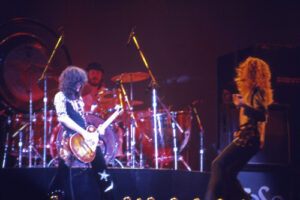Our exploration of the Top 10 Regina Spektor Songs unveils the captivating journey of a Russian-American artist, deeply rooted in a rich musical heritage. Born in 1980 into a Russian-Jewish family with a strong musical lineage, Regina Spektor’s early inclination towards music was hardly surprising. Her father, an avid amateur violinist, and her mother, a distinguished music professor in the Soviet Union, played pivotal roles in shaping her musical foundation. Regina’s brother, Boruch, also shared this musical passion, featuring in Regina’s 2004 album “Soviet Kitsch.”
Regina’s musical education began at the tender age of seven, practicing piano on a Petrof upright, a cherished gift from her grandfather. Her childhood was enveloped in classical melodies and the vibrant tunes of Russian bands, further enriched by her father’s introduction to iconic rock and roll bands like The Moody Blues and The Beatles, which Regina adored.
Further honing her craft, Regina trained in classical piano under the guidance of Sonia Vargas, a revered professor at the Manhattan School of Music. Her songwriting talent blossomed early, captivating peers with compositions she crafted in her youth, a talent that continued to flourish through her interactions during a visit to Israel.
Regina Spektor’s foray into the music industry was marked by her immersion in New York City’s anti-folk scene, a vibrant community that embraced her unique sound. Her career took a significant leap forward when she joined The Strokes on their nationwide tour as an opening act, even collaborating on the track “Modern Girls & Old Fashion Men.”
Regina Spektor’s musical oeuvre is a testament to her eclectic influences, spanning punk, rock, folk, hip-hop, jazz, and classical genres. Her performances are characterized by her expansive vocal range and the ability to effortlessly transition to a mesmerizing falsetto, making her songs not just music but a profound emotional experience. Here are ten of Regina Spektor’s songs that stand as a testament to her diverse talent and indelible impact on the music world.
# 10 – Blue Lips
Kicking off our Top 10 Regina Spektor Songs is the captivating “Blue Lips” from her 2009 album, “Far.” This track is a quintessential showcase of Spektor’s ability to blend spontaneity with profound lyrical depth in her songwriting. “Blue Lips” delves into the theme of a religious awakening, portraying a protagonist who stumbles upon faith, yet remains somewhat skeptical about its practice and manifestations in the world.
A standout feature of the song is its memorable piano riff, which underscores Spektor’s adeptness with melody, honed through her extensive background in jazz music. This element not only highlights her technical skill as a musician but also her capacity to weave intricate emotional narratives through her compositions, making “Blue Lips” a compelling opening to the exploration of her diverse and impactful discography.
# 9 – Laughing With
“Laughing With,” a poignant track from Regina Spektor’s 2009 album “Far,” explores themes of spirituality and existential reflection with a nuanced touch. The song thoughtfully engages with the adage that suggests “there are no atheists in foxholes,” probing the complexities of faith and disbelief, especially in moments of profound crisis or near the end of life. Spektor’s lyrics ponder the challenges of maintaining atheistic convictions in the face of mortality, suggesting that in moments of ultimate vulnerability, the certainty of disbelief can waver.
Further, “Laughing With” introduces the intriguing notion that God might have a sense of humor, albeit one that plays out before an audience too entangled in their fears and reverences to appreciate the lighter side of the divine. This layer of the song adds depth to Spektor’s exploration of faith, offering a perspective that is both introspective and subtly ironic. Through “Laughing With,” Spektor invites listeners to reflect on the human condition, faith, and the complexities of confronting one’s beliefs with a blend of earnest inquiry and gentle skepticism.
#8 – On The Radio
Featured on Regina Spektor’s critically acclaimed fourth album, “Begin to Hope,” “On The Radio” stands out not only for its melodic allure but also for its lyrical nod to Guns N’ Roses’ iconic song “November Rain” within its chorus. This track followed the success of Spektor’s third studio album, “Soviet Kitsch,” and further cemented her status as a distinctive voice within the music industry.
“Notable for its broad appeal, “On The Radio” has been selected as a soundtrack for various films and television shows, underlining its resonance with a wide audience. The song’s accompanying music video, which charmingly depicts Spektor leading a music class for young children, captures the whimsical and heartfelt nature of her artistry.
The song’s compelling composition and Spektor’s unique storytelling ability propelled “On The Radio” to achieve notable success, peaking at number 60 on the UK Singles Chart. Its blend of poignant lyrics and engaging melodies exemplifies Spektor’s skill in crafting songs that are both deeply personal and universally relatable, making “On The Radio” a cherished piece in her discography.
#7 – How
“How,” a poignant piano ballad from Regina Spektor’s 2012 album “What We Saw From The Cheap Seats,” delves into the theme of heartbreak with raw emotional depth. Renowned for her ability to traverse a wide array of lyrical landscapes, Spektor ventures into the territory of breakup themes with this track, showcasing a side of her songwriting that she seldom explores.
The song’s production, helmed by Mike Elizondo, brought a unique dimension to Spektor’s vocal performance. Elizondo himself noted in an interview that, despite the song’s focus on a subject matter that is not typically central to Spektor’s work, “How” managed to highlight the exceptional range and emotional resonance of her voice. The track stands as a testament to the idea that moments of profound emotional turmoil, such as those experienced during a breakup, can often serve as a catalyst for artists to tap into unparalleled levels of performance and vulnerability. Through “How,” Spektor offers listeners a deeply moving exploration of love, loss, and the quest for understanding in the aftermath of a relationship’s end.
#6 – Don’t Leave Me
In a compelling demonstration of how revisiting and reimagining one’s work can breathe new life into it, Regina Spektor chose to reinvent her song “Ne me Quitte Pas” from her 2002 album, “Songs.” This process wasn’t merely a re-recording; it was a creative overhaul that saw Spektor infusing the track with fresh elements, including the vibrant sounds of steel drums and trombone, adding a new layer of depth and texture to the composition.
This reimagined version found its place on Spektor’s 2012 album, “What We Saw From The Cheap Seats,” showcasing her willingness to evolve and experiment with her music. The decision to give “Ne me Quitte Pas” a second life not only highlights Spektor’s dedication and determination to her craft but also her ability to see potential for transformation and growth in her previous works. This approach underscores the notion that sometimes, success and artistic fulfillment lie in the willingness to revisit and refine one’s creations with renewed passion and perspective.
#5 – Eet
Navigating the aftermath of a failed relationship is a deeply personal experience, one that Regina Spektor explores with poignant vulnerability in her song “Eet” from the album “Far.” Spektor captures the essence of this emotional turmoil through a compelling metaphor, likening the sense of loss and confusion that accompanies the end of a relationship to the frustration of forgetting the lyrics to a favorite song. This analogy beautifully encapsulates the disorientation and longing for something once familiar and cherished, now out of reach.
The title “Eet” itself is a testament to Spektor’s inventive use of her voice, not just as a medium for lyrics, but as an instrument capable of creating a wide array of sounds and textures. This track showcases Spektor’s unique ability to weave complex emotions into her music, using both the content of her lyrics and the quality of her sound to convey the depth of human experience. Through “Eet,” Spektor invites listeners into a reflective space, exploring the themes of memory, loss, and the search for solace in the wake of a failed relationship.
#4 – You’ve Got Time
Despite not clinching the Grammy Award for Best Song Written for Visual Media in 2014, which went to Adele’s “Skyfall,” Regina Spektor’s “You’ve Got Time” holds a special place in the hearts of many, particularly fans of the American Netflix comedy-drama “Orange is the New Black.” This series, which delves into the life of New Yorker Piper Chapman as she navigates the complexities of life in a women’s prison, uses “You’ve Got Time” as its theme song, further embedding the track in the cultural fabric of the show.
The song’s connection to the show, which explores themes of freedom, confinement, and redemption, resonates deeply with viewers, making it more than just a theme song but an integral part of the series’ identity. Released on iTunes in 2013, “You’ve Got Time” was met with positive acclaim, showcasing Spektor’s talent for crafting songs that not only stand alone as compelling pieces of music but also enhance and complement visual media. The song’s enduring popularity underscores the impact of a well-crafted theme song in enriching a show’s narrative and emotional landscape.
#3 – Us
“Us,” a standout track from Regina Spektor’s album “Soviet Kitsch,” marks a significant moment in her musical journey, capturing the essence of disillusionment and the quest for meaning in a complex world. The song navigates the realization that many of our perceptions of the world are, in fact, illusions, painting a vivid picture of life as a “den of thieves” where individuals tirelessly search for solutions to their myriad problems.
Through “Us,” Spektor delves into the sobering reality that definitive answers to life’s challenges often remain elusive, perhaps only becoming clear as one approaches the end of their journey. Yet, amidst this exploration of life’s inherent uncertainties and struggles, the song also carries an undercurrent of hope and resilience. Spektor suggests that despite the trials and tribulations life may present, there exists an abundance of small, yet profound moments of joy and happiness.
This duality captured in “Us” — the coexistence of life’s harsh realities with its fleeting, beautiful moments — resonates deeply, offering listeners a nuanced reflection on the human condition. Spektor’s ability to weave such complex themes into her music, coupled with her distinctive sound, cements “Us” as a pivotal track that not only highlights her early success but also her depth as a songwriter and artist.
#2 – Samson
“Samson” stands out as one of Regina Spektor’s most celebrated works, transcending its non-single status to become a fan favorite and chart in several countries. Originally recorded for her second album “Songs” on Christmas Day 2001, Spektor’s “Samson” captures the raw emotion and simplicity of her early work, recorded in a single take. The song was re-envisioned for her major-label debut, “Begin to Hope” in 2006, bringing a new depth and broader audience to this poignant track.
Drawing from the biblical tale of Samson and Delilah, the song weaves a narrative of love, betrayal, and forgiveness. Spektor’s lyrical prowess shines as she explores the complexities of unconditional love, even in the face of profound betrayal, a theme encapsulated in the intimate and vulnerable retelling of Samson’s strength and downfall. The accompanying music video, shot in a stark, almost black and white style, features Spektor at her piano, further emphasizing the song’s intimate and personal nature.
Despite never being officially released as a single, the “Begin to Hope” version of “Samson” resonated widely, charting in Australia, Belgium, Sweden, and the UK, and selling over 143,000 copies in the United States by 2009. This track not only showcases Spektor’s unique ability to blend classical storytelling with contemporary themes but also solidifies “Samson” as one of her most enduring and beloved songs.
#1 – Fidelity
“Fidelity” stands as Regina Spektor’s most iconic single, hailing from her fourth studio album Begin to Hope. Released on September 25, with its captivating music video debuting even earlier, the track took a while to gain momentum, eventually making its mark on the charts in December. The song’s UK release saw it split into a two-part single on March 12, 2007, further solidifying its global appeal and marking it as Spektor’s highest-charting single worldwide.
The inspiration for “Fidelity” struck Spektor while she was watching the film High Fidelity, a story based on Nick Hornby’s novel, which explores themes of love, music, and the complexities of relationships. The song’s success was monumental for Spektor, marking her first and only entry on the Billboard Hot 100 and becoming her best-performing track to date. Certified gold by the RIAA for sales surpassing 500,000 copies, “Fidelity” had sold 716,000 copies in the United States by 2009, attesting to its enduring popularity.
The music video for “Fidelity,” directed by Marc Webb, is a visually striking piece featuring Spektor in a monochromatic setting, engaged in a surreal tea party with an empty suit, symbolizing an absent companion. The narrative evolves to introduce vibrant colors through a heart pendant, culminating in a whimsical finale with Spektor and a man, played by Scoot McNairy, bringing a splash of color to their monochrome world. This video, coupled with the song’s inclusion in various TV shows and films such as Veronica Mars, Grey’s Anatomy, and Love & Other Drugs, has cemented “Fidelity” as a seminal piece in Spektor’s discography and a beloved track in popular culture.
Photo: Dese’Rae L. Stage, CC BY 3.0 <https://creativecommons.org/licenses/by/3.0>, via Wikimedia Commons





































Wow! I love the list that you guys put up. Reminded me of an artist whose music I like (But forget most times since there are better artists than her). Choosing between Samson and Fidelity has been the biggest task ever! But I think Fidelity takes the day as you listed. I’m impressed, kudos!